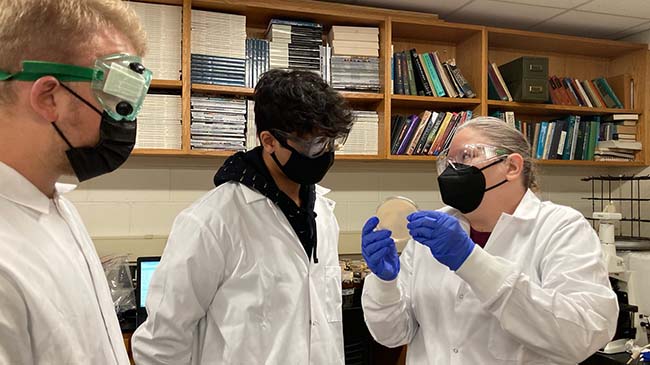By Steven Krolak
(NEW ALBANY, Ind.)–The IU Southeast biology program has received a grant from the IU Women’s Philanthropy Leadership Council to support its initiative, “Science is for Everyone: Broadening Access to Undergraduate Research.”
This innovative project enables introductory biology undergraduates to participate in a year-long, in-class, authentic research project to identify and characterize novel bacteriophages (viruses that infect bacteria). Each student has the potential to discover a previously unknown virus.
This effort is part of the broader Science Education Alliance Phage Hunters Advancing Genomics and Evolutionary Science (SEA-PHAGES) program that has brought similar phage-hunting experiences to over 100 colleges and universities, according to Dr. Pam Connerly, professor of biology, who co-leads the initiative alongside Dr. Beth Rueschhoff, associate professor of biology.

Early participation in research is a high-impact practice considered key to developing interest and, in the larger context, to keeping students in school.
This is especially true for the sciences, which encompass fields that are constantly changing. Being able to contribute to those fields encourages students to pursue additional training and advanced positions in science, according to Connerly. Being involved in research early means that undergraduates learn to design experiments, test hypotheses, troubleshoot, deal with adversity, read the literature, consult with colleagues, keep records, annotate genomes, communicate results, and much more.
“There can be a lot of basic biology knowledge to learn and remember in the introductory series, and pairing that learning with application throughout the year in the lab helps to solidify the importance of the information and give it context,” Connerly said. “Students who get engaged will learn more and persist more in the field.”
The field also benefits from undergraduate participation.
“Science needs more diversity at all ranks,” Connerly said. “Broadening the availability of undergraduate research by incorporating it into class time has the potential to draw those students into the true process of science who might not think they have the skills or time to do research.”

She believes that specifically in the field of phage genomics, undergraduate students are extremely well-suited for bringing in diverse soil samples to more broadly sample phages in the ecosystem. By essentially crowd-sourcing phages, this area of research can–and already has–made rapid strides. And that has a tremendous social benefit.
“The large number of schools and students involved in SEA-PHAGES is allowing our understanding of phage genomics to grow at an astounding pace, which can then be utilized by various researchers to look at questions about bacterial ecology, genome evolution, and even using phages to fight antibiotic-resistant bacterial infections,” Connerly said.
The grant for this initiative came in the WPLC’s 10th year of funding projects that strive to improve public health, support leadership initiatives, promote STEM disciplines, develop a culture of philanthropy, and provide global or service-learning experiences for students at Indiana University.
Representing the biology program, Connerly was among 14 leaders from across seven IU campuses invited to present projects to the council. In partnership with the IU Foundation’s Well House Society, Queer Philanthropy Circle, and Board of Directors Advancement of Philanthropy Committee, all 14 finalists received at least partial funding.
In all $165,000 was awarded by the WPLC, with an additional $31,223 in personal funding from inspired council members.
Homepage photo: Biology students Courtney Tepe and Jimmy Vo prepare serial dilutions as part of the WPLC grant-funded “Science is for Everyone” initiative.


